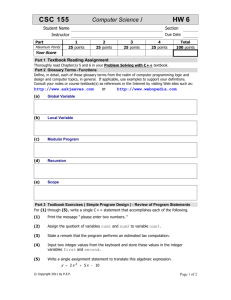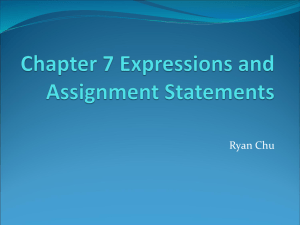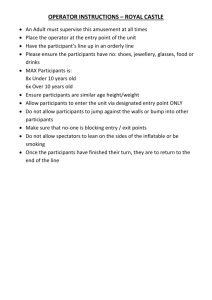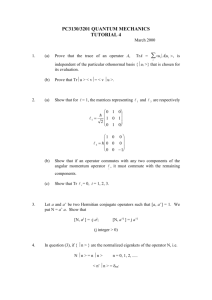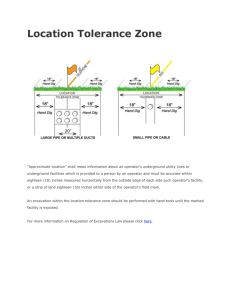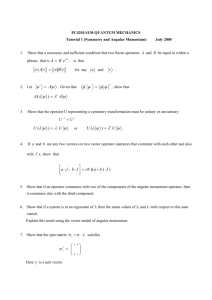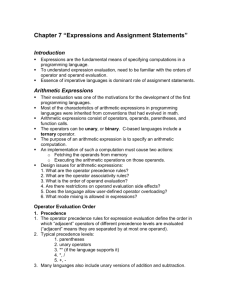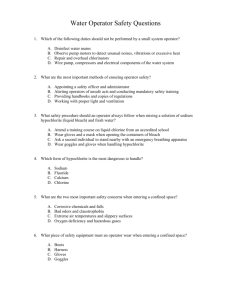Chapter 7 Expressions and Assignment Statements
advertisement
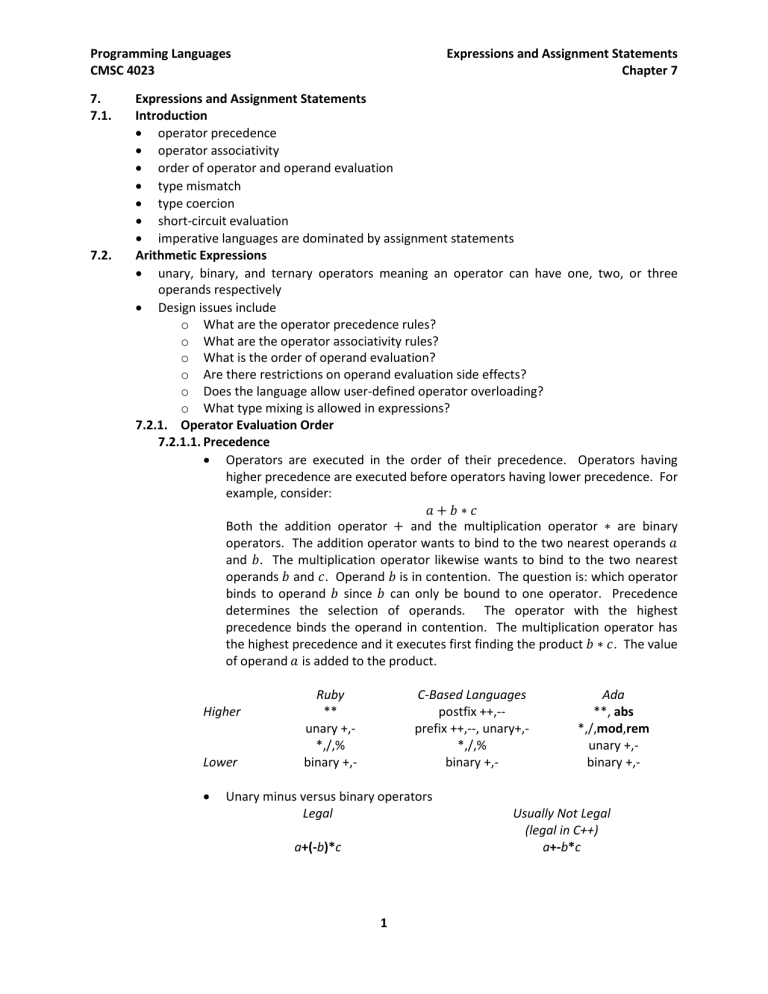
Programming Languages
CMSC 4023
7.
7.1.
7.2.
Expressions and Assignment Statements
Chapter 7
Expressions and Assignment Statements
Introduction
• operator precedence
• operator associativity
• order of operator and operand evaluation
• type mismatch
• type coercion
• short-circuit evaluation
• imperative languages are dominated by assignment statements
Arithmetic Expressions
• unary, binary, and ternary operators meaning an operator can have one, two, or three
operands respectively
• Design issues include
o What are the operator precedence rules?
o What are the operator associativity rules?
o What is the order of operand evaluation?
o Are there restrictions on operand evaluation side effects?
o Does the language allow user-defined operator overloading?
o What type mixing is allowed in expressions?
7.2.1. Operator Evaluation Order
7.2.1.1. Precedence
• Operators are executed in the order of their precedence. Operators having
higher precedence are executed before operators having lower precedence. For
example, consider:
𝑎+𝑏∗𝑐
Both the addition operator + and the multiplication operator ∗ are binary
operators. The addition operator wants to bind to the two nearest operands 𝑎
and 𝑏. The multiplication operator likewise wants to bind to the two nearest
operands 𝑏 and 𝑐. Operand 𝑏 is in contention. The question is: which operator
binds to operand 𝑏 since 𝑏 can only be bound to one operator. Precedence
determines the selection of operands. The operator with the highest
precedence binds the operand in contention. The multiplication operator has
the highest precedence and it executes first finding the product 𝑏 ∗ 𝑐. The value
of operand 𝑎 is added to the product.
Higher
Lower
•
Ruby
**
unary +,*,/,%
binary +,-
C-Based Languages
postfix ++,-prefix ++,--, unary+,*,/,%
binary +,-
Unary minus versus binary operators
Legal
a+(-b)*c
1
Ada
**, abs
*,/,mod,rem
unary +,binary +,-
Usually Not Legal
(legal in C++)
a+-b*c
Programming Languages
CMSC 4023
Expression
-a/b
-a*b
-a**b
Expressions and Assignment Statements
Chapter 7
Meaning
(-a)/b or –(a/b)
(-a)*b or –(a*b)
-(a**b)
Language(s)
Fortran, Ruby,
Visual Basic, Ada
Discussion
Equivalent
Equivalent
** has higher
precedence than
unary -
7.2.1.2. Associativity
• When two or more operators have the same precedence in an expression,
associativity determines the order of evaluation. Consider the following
example:
𝒂−𝒃+𝒄−𝒅
Operands b and c are in contention. The subtraction operator and the addition
operator are contending for operand b and operand c. Because addition and
subtraction associate to the left in almost all cases, the difference 𝑎 − 𝑏 is
computed first, then c is added to the difference and, finally d is subtracted
from the sum. The parenthesized expression below shows the order of
operation.
(�(𝒂 − 𝒃) + 𝒄� − 𝒅)
Note how the parentheses are grouped on the left. Whenever operators
associate to the left, an equivalent event occurs. Parentheses pile up on the
left.
An analogous situation occurs when operators associate to the right.
Parentheses pile up on the right. Consider the following example in C++:
𝒂=𝒃=𝒄=𝒅+𝟏
Obviously, we cannot assign b to a because we do not have a value for b yet.
Assignment operators associate to the right is C, C++, and Java. First the sum
𝒅 + 𝟏 is evaluated and assigned to c. Then c is assigned to b. Finally, b is
assigned to a.
(𝒂 = �𝒃 = �𝒄 = (𝒅 + 𝟏)��)
Note how parentheses pile up on the right.
In many languages the exponentiation operator associates to the right.
𝑎 ∗∗ 𝑏 ∗∗ 𝑐
is
(𝑎 ∗∗ (𝑏 ∗∗ 𝑐))
However, in Ada the exponentiation operator is non associative forcing the use
of parentheses.
2
Programming Languages
CMSC 4023
Expressions and Assignment Statements
Chapter 7
Legal in Ada
a**(b**c)
(a**b)**c
Not Legal in Ada
a**b**c
7.2.1.3. Parentheses
• Programmers can alter the precedence and associativity rules by placing
parentheses in expressions. For example:
(𝒂 + 𝒃) ∗ 𝒄
(𝒂 + 𝒃) + (𝒄 + 𝒅)
In the foregoing example, if the sum of a, b, and c cause an overflow and d is
negative to the degree that an overflow can be prevented; the parentheses
shown above could be used to prevent an overflow.
7.2.1.4. Ruby Expressions
• All arithmetic, relational, assignment, array indexing, shifts, and bit-wise logic
operators are implemented as methods.
7.2.1.5. Conditional Expressions
average=(count==0)?0:sum/count;
if (count==0) average=0; else average=sum/count;
7.2.2. Operand Evaluation Order
• Only when the evaluation of operands cause side effects is the order of
evaluation important (only when an operand is a function call).
7.2.2.1. Side Effects
•
•
A side effect of a function occurs when the function changes either one of its
parameters or a global variable.
Detrimental side effect
int a=5;
int f(){a=17; return 3;}
int main()
{ a=a+f();
return 0;
}
If the expression a+f() is evaluated from left to right it value is 8. However, if
the expression is evaluated from right to left its value is 20.
•
Beneficial side effect
void swap(int& m,int& w){int b=m;m=w;w=b;}
int main()
{ int a(1),b(2);
swap(a,b);
return 0;
}
3
Programming Languages
CMSC 4023
Expressions and Assignment Statements
Chapter 7
7.2.2.2. Referential Transparency and Side Effects
• A program has the property of referential transparency if any two expressions
in the program that have the same value can be substituted for one another
anywhere in the program, without affecting the action of the program.
//A fragment that has the property of referential transparency
result1=(fun(a)+b)/(fun(a)-c);
temp=fun(a);
result2=(temp+b)/(temp-c);
If the function fun has no side effects, result1 and result2 will be equal, because
the expressions assigned to them are equivalent. However, suppose fun has the
side effect of adding 1 to either b or c. Then result1 would not be equal to
result2.
•
•
7.3.
Overloaded Operators
•
•
7.4.
The semantics of a referentially transparent program are much easier to
understand because functions become equivalent to mathematical functions.
Pure functional programs are referentially transparent and have been used to
prove attributes of programs.
The multiple use of an operator is called operator overloading.
int a(1),b(2),c;
c=a&b;
//bitwise and
int* p=&a;
//address operator
Problems.
o Using the same symbol for two completely unrelated operations is
detrimental to readability.
o The simple keying error of leaving out the first operand for a bitwise
AND operation can go undetected by the compiler, because it is
interpreted as an address-of operator. Such an error may be difficult to
diagnose.
Type Conversions
• Type conversions are either narrowing or widening.
o A narrowing conversion converts a value to a type that cannot store
even approximations of all of the values of the original type.
int a; double pi(3.14159); a=(int)pi;
o
A widening conversion converts a value to a type that can include at
least approximations of all of the values of the original type.
4
Programming Languages
CMSC 4023
Expressions and Assignment Statements
Chapter 7
int a(37); double b; b=(double)a;
7.4.1. Coercion in Expressions
•
A mixed-mode expression is one where an operator can have operands of
different types.
double pi(3.14159); double r(3.5); double d=2*pi*r;
Integer constant 2 and variable pi have different types. The integer constant is
coerced to type double prior to multiplication.
•
Ada does not permit mixed mode expressions and forces the programmer to
employ explicit type conversions.
A:Integer;
B,C,D:Float;
…
C:=B*A; -- not legal in Ada
7.4.2. Explicit Type Conversion
•
•
Most languages provide some capability for performing explicit conversions.
In C-based languages, explicit type conversions are performed using casts.
int a(37); double b; b=(double)a;
•
In Ada, explicit type conversions take the form of function calls.
Float(Sum)
7.4.3. Errors in Expressions
• An overflow occurs when the result of an arithmetic operation is too large to be
stored in the designated memory cell.
• An underflow occurs when the result of an arithmetic operation is too small to
be stored in the designated memory cell.
• An exception can be thrown (raised) by the runtime environment in some
languages when an overflow or underflow occurs.
5
Programming Languages
CMSC 4023
7.5.
Expressions and Assignment Statements
Chapter 7
Relational and Boolean Expressions
7.5.1. Relational Expressions
•
A relational operator is an operator that compares the values of its two
operands.
Language
Inequality
operator
•
•
C-based
!=
Ada
/=
Lua
~=
Fortran 95
.NE.
Pascal
<>
Javascript and PHP have convert and compare equality and inequality operators.
“7”==7
//The string “7” is coerced to a numeric 7 and the equality
//operator returns true
“7”===7
//The string “7” is not coerced to a numeric 7 and the equality
//operator returns false
Relational operators always have lower precedence so arithmetic operations are
performed first.
a+1>2*b
7.5.2. Boolean Expressions
•
•
•
Common Boolean operations include AND, OR, NOT, and EXCLUSIVE-OR.
In the mathematics of Boolean algebra, the OR and the AND operators must
have equal precedence. However, Rosen in Discrete Mathematics and Its
Applications, 6th Ed. assigns precedence in the table below
TABLE 8 Precedence of
Logical Operators
Operator
Precedence
1
¬
2
∧
∨
3
4
→
↔
5
6
Programming Languages
CMSC 4023
•
Expressions and Assignment Statements
Chapter 7
In C-based languages, precedence of operators is given in the table below.
Operator
postfix ++, -unary +, - , prefix ++, --, !
*, /, %
binary +, <, >, <=, >=
=, !=
&&
||
•
Precedence
Highest
Lowest
In Pascal.
Operator
not
*, /, div, mod, and
unary +, binary +, -, or
=,<>,<,<=,>,>=,in
Precedence
Highest
Lowest
0<=a and a<=10 {Invalid in Pascal }
0<=a && a<=10 //valid in C-based languages}
7.6.
Short-Circuit Evaluation
•
A short-circuit evaluation of an expression is one in which the result is
determined without evaluating all of the operands or operators.
(a>=0)&&(b<10)
//If a<0 then the expression (b<10) need not be evaluated
//Mandatory short-circuit evaluation
while ((index<listlen)&&(list[index]!=key)) index=index+1;
(a>b)||((b++)/3)
•
//(a>b) or (b++/3!=0) – b++ need not be evaluated
Short-circuit evaluation can be specified in Ada.
Index:=1;
while (Index<=Listlen) and then (List(Index)/=Key)
loop
Index:=Index+1;
end loop;
•
Ruby, Perl, and Python implement short-circuit evaluation on all logical
operators.
7
Programming Languages
CMSC 4023
7.7.
Expressions and Assignment Statements
Chapter 7
Assignment Statements
7.7.1. Simple Assignments
•
ALGOL 60 pioneered the use := as the assignment operator to distinguish it from
the equality operator.
7.7.2. Conditional Targets
•
Perl.
($flag?$count1:$count2)=0
is equivalent to
if ($flag) { $count1=0; } else { $count2=0;}
7.7.3. Compound Assignment Operators
•
•
A compound assignment operator is a shorthand method of specifying a
commonly needed form of assignment.
Introduced in Algol 68 and later modified slightly in C-based languages. Perl,
JavaScript Python, and Ruby also support compound assignment operators.
sum+=value;
//sum=sum+value;
7.7.4. Unary Assignment Operators
•
A unary assignment operator combine increment and decrement operations
with assignment.
count++;
//count=count+1;
sum=++count; //count=count+1; sum=count;
sum=count++; //sum=count; count=count+1;
•
When two unary operators apply to the same operand, the association is right
to left.
-count++;
/- (count++) not (-count)++
8
Programming Languages
CMSC 4023
Expressions and Assignment Statements
Chapter 7
7.7.5. Assignment as an Expression
•
The value assigned is the value of the expression.
while((ch=getchar())!=EOF){…}
•
Consider the statement.
a=b+(c=d/b)-1;
1. c=d/b;
2. t=b+c;
3. a=t-1;
•
Assignment expressions permit a multi-target assignment.
sum=count=0;
•
Some operators are more equal than others. Consider
if (x=y) …
or
if (x==y) …
7.7.6. List Assignment
•
Perl.
($first,$second,$third)=20,40,60);
7.8.
Mixed Mode Assignments
•
Fortran, C, C++, and Perl use coercion rules for mixed-mode assignment.
int a(29); double d=a;
9
